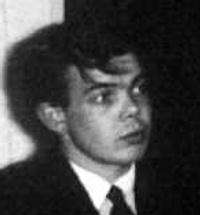Bill Hopkins (composer)
G.W. (Bill) Hopkins (5 June 1943 – 10 March 1981) was a British composer and music critic.

Biography
Hopkins was born in Prestbury, Cheshire, and educated at Rossall School, Lancashire; his mother's learning difficulties meant she was unable to look after him, and he was raised by aunts. An encounter with Luigi Nono at Dartington consolidated his interest in serialism; subsequently he studied at Oxford University with Edmund Rubbra and Egon Wellesz.
In 1964 he went to Paris, ostensibly to study with Olivier Messiaen but with the prime objective of meeting and studying with Jean Barraqué. Returning to England, he supported himself as a music critic in London and then, after moving first to Tintagel, Cornwall and subsequently to Peel, Isle of Man, by translation and writing music criticism. He married Clare Gilbert in 1972. Subsequently, he taught at Birmingham University and University of Newcastle upon Tyne before succumbing to a heart attack, in Chopwell, near Newcastle, at the age of 37. His few pupils included the British composers Paul Keenan and Patrick Ozzard-Low.
He was upset at an under-rehearsed first performance of En Attendant in 1977 and this possibly discouraged him from composition for a while. He was working on an opera project, tentatively called Ness, but little if any of this was completed.
Compositions
Bill Hopkins' compositions were largely unpublished at his death, but following efforts by Nicolas Hodges and Patrick Ozzard-Low they are now all published, many in new editions.
- Sous-structures. Solo piano. 1964, first performed 1965 (publ. UE)
- Two Pomes, after James Joyce. Soprano, bass clarinet, trumpet, harp, viola. 1964, first performed 1968 (publ. UE)
- Musique de l'indifférence, Ballet after Samuel Beckett. Orchestra, 1964–65, first performed 2019 (publ. Ricordi)
- Sensation. Soprano, tenor sax, trumpet, harp, violin. 1965, first performed 1965. (publ. UE)
- Etudes en serie. Solo piano. 1965–72, first complete performance 1997. (publ. Schott)
- Pendant. Solo violin. 1969, rev 1973, first performed 1975. (publ. UE)
- Nouvelle etude hors serie. Solo organ. 1974, first performed 1993. (publ. UE)
- Lindaraja by Claude Debussy, orchestrated by Hopkins. Orchestra. 1975, first performed 2019. (publ. UE)
- En Attendant. Flute, oboe, cello, harpsichord. 1976–77, first performed 1977. (publ. UE)
Recordings
His complete piano works have been recorded by Nicolas Hodges, (col legno, 2000). En Attendant, Two Pomes, Pendant and Sensation have been recorded by Music Projects/London and Richard Bernas, (NMC, 1992).[1]
Notes
References
- Griffiths, Paul, "Bill Hopkins: A Provisional Catalogue of Compositions and Writings", Musical Times cxxii (1981), 600
- Griffiths, Paul, "Hopkins, Bill", in Sadie, Stanley (ed.) The New Grove Dictionary of Music & Musicians, Second Edition (2001), Vol. 11, pp. 698-9
- Hodges, Nicolas, "The Music of Bill Hopkins: A Preliminary Approach", Tempo No.186, September 1993